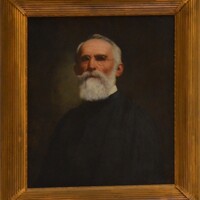DuBose, William Porcher
Item
- Connection to Legacies of American Slavery Database
- Name
- One-line bio
- Biography
- Date of Birth
- Date of Death
- Historical Period
- Related Organization(s)
- Employed By
- Wikidata Link
-
DuBose, William Porcher
-
One of the most influential theologians in the history of the American Episcopal Church and an apologist for American slavery, William Porcher DuBose served in the Confederate military as a combatant and later chaplain and taught at the University of the South from 1871 until 1908.
-
The Rev. William Porcher DuBose was a slave-owner, fought in the Confederate Army, and after the war, remained unrepentant about slavery and the Confederacy. DuBose was born into a prominent family of planters and slaveholders in Winnsboro, South Carolina. In 1860, the DuBose family enslaved 204 persons on their Farmington Plantation. DuBose was a cadet at the Citadel when the Civil War began. He joined the Confederate Army as a soldier, and later after being wounded and his ordination as a deacon in the Episcopal Church of the Confederate States of America, he rejoined the army as a Chaplain. After the war, DuBose served as a parish priest in South Carolina. He came to Sewanee in 1871. He is remembered at Sewanee for his service to the University as the first Chaplain, as a Professor of Ethics, and as a Dean of the Episcopal School of Theology. He was a prolific author, publishing several books of theology. He remains a revered theologian in the Episcopal Church, and he is commemorated on the Episcopal calendar on August 18. In a piece written for The Sewanee Review in 1902, DuBose said of slavery, “The South received and exercised slavery in good faith and without doubt or question, and, whatever we pronounce it now, it was not sin at that time to those people.” In a plaque dedicated to him in the university's All Saints’ Chapel, he is remembered as “Soldier - Philosopher - Theologian.” DuBose died in Sewanee in 1918 and is buried in the University Cemetery. His grave marker in Sewanee's University Cemetery is unusual for its size; it notes his military service to the Confederacy.
-
11 April 1836
-
18 August 1918
Position: 782 (8 views)





